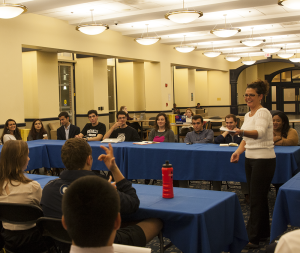
Students expressed concerns about meal plans at a forum on Thursday.
The university is no longer considering mandating a third-year meal plan, Vice President for Auxiliary Services Joelle Wiese announced at a forum in Sellinger Lounge on Thursday night.
“We were just kind of brainstorming and throwing [ideas] out there and that just happened to be one of them,” Wiese said. “It was never a formal proposal. It was never on the table and it was never concrete. It is not on the table anymore.”
The Georgetown University Student Association announced the university’s proposed meal plan mandate in a press release last Wednesday.
The forum aimed to garner student input about dining options, after the students expressed strong opposition to the proposal of the required third-year meal plan. An IdeaScale petition against the plan received 604 upvotes.
“We want to try and discuss and get some ideas of what food for the future on campus will look like,” Wiese said.
Representatives from Aramark, the managing group behind Georgetown’s dining services, were also present at the forum.
Students raised various concerns about the existing two-year meal plan requirement, O’Donovan Hall’s hours of operations and the expansion of meal swipes to other eating establishments on campus.
Some students inquired as to why students are required to purchase a meal plan for two years.
“Here it’s not even a second year mandate you just have to buy a meal plan if you are not living in apartment style housing so in part it is also where you live and are assigned to live in the [housing] lottery,” said Wiese.
Students also suggested making block meal plans an option for first-year students. While freshmen were always required to have weekly meal plans, beginning this semester the university mandated that first-year students purchase at least 14 meals a week. Previously, freshmen were able to purchase a 10-swipe weekly meal plan.
“There aren’t kitchens [in freshman dorm rooms]. There is a certain pragmatic perspective, when you first go to college, to build support network relationships and a lot of that happens in the dining hall,” Wiese said.
Wiese declined to disclose Aramark’s profits from Georgetown dining when asked. In addition to running dining services at Leo’s, Aramark operates Hoya Court and the Einstein Bros locations in Regents Hall and Car Barn.
Wiese also said that she did not have an estimate of how many meal swipes go unused each semester.
Students posed suggestions such as keeping the top floor of Leo’s open on the weekends, having containers available at Leo’s to take home leftovers and expanding meal swipes to Hoya Court and Epicurean.
Wiese said that the university would take all ideas into account but did not give any specific plans to address them.
Ryan Kuchinski (COL ’17) said that he attended the forum because he was frustrated with university dining services.
“I just really view dining services and Aramark as out of touch. I left the meeting with the view that they made an attempt that seemed half-hearted to engage with students,” Kuchinski said. “I think that a lot of the questions were answered indirectly and with broad statements about our Jesuit values as if that was enough to justify some of the problems we have seen that contradict those Jesuit values.”
Thomas Stubna (COL ’18) also said that he did not feel that the university adequately responded to students during the forum.
“There was a lot of dodging of student questions and more ‘We will get back to you on that’ answers, so I do not have a positive impression about the way this is going,” Stubna said.
Adeliana Lancianese (SFS ’17) said that she was initially optimistic about the forum but was disappointed by its results.
“I came tonight because I wanted more transparency from Leo’s and Aramark. I was at first impressed with the transparency of auxiliary services,” Lancianese said. “But… [Aramark’s] representative sat in the back playing with his cell phone the whole time. I know that Aramark has a very bad reputation in general for bad prison treatment and bad school treatment. So I would like to know what their motivations are – to make more than a profit, to have good service.”





















SFS '13 • Oct 20, 2014 at 5:20 pm
The best quote: “It was never on the table…it is not on the table anymore.”